Top 10 Duct Tape Marketing Podcast Episodes of 2024 written by John Jantsch read more at Duct Tape Marketing
As we wrap up 2024, I can’t help but look back at all the incredible conversations I had on the Duct Tape Marketing Podcast this year. Marketing is changing faster than ever, and small businesses have been riding the wave—adapting to new trends, embracing tech, and finding fresh ways to connect with their customers. This year has been all about staying creative, staying connected, and making things happen, and I’ve had the privilege of digging into all of that with some amazing guests.
I thought it’d be fun to round up the episodes that really hit home with listeners this year. These were the top podcast episodes of 2024 that brought the most value, sparked the best ideas, and inspired action. If you missed any, now’s the perfect time to tune in!
If you enjoyed what you heard here, check out the full line-up of shows.
1. Stephan Spencer-Mastering SEO in the Age of AI
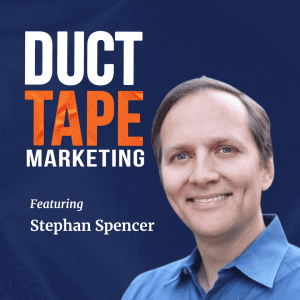
Stephan Spencer is an SEO pro, founder of Net Concepts, and host of the podcasts Get Yourself Optimized and Marketing Speak. In this episode of the Duct Tape Marketing Podcast, Spencer and I dig into how AI is changing the game for SEO and what you can do to keep up.
Biggest takeaway:
SEO in 2024 is all about adapting to AI. Spencer shares how to use AI tools to create better content, optimize your site, and stay ahead of the competition. Whether you’re an SEO veteran or just trying to boost your online presence, his advice will help you navigate this evolving landscape and set your business up for success.
Click here to listen to the episode.
2. John Jantsch – Unlocking the Secrets to Premium Pricing in Professional Services
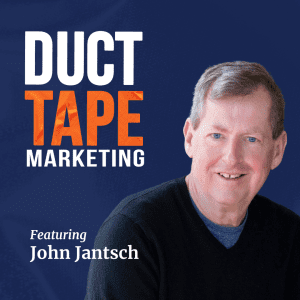
Pricing professional services can feel tricky—unlike products, services are intangible, and their value can vary from client to client. In this episode of the Duct Tape Marketing Podcast, I dive into the strategies that help businesses charge premium prices by focusing on solutions instead of just selling services.
Biggest takeaway:
It all starts with messaging. To charge a premium, you need to clearly communicate the problem you solve and show clients you truly understand their challenges. From there, it’s about standing out with a unique approach, building trust through personalization, and offering productized packages that make your services easy to understand and buy.
I also explore how to create long-term relationships and shift to a scalable, recurring revenue model by delivering consistent value to specific clients.
Click here to listen to the episode.
3. Seth Godin – How to Build Game-Changing Strategy by Choosing Your Customers and Competition
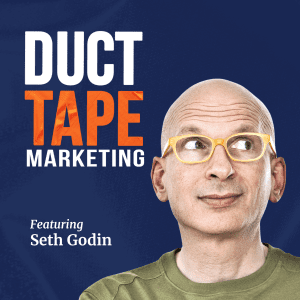
I had the pleasure of chatting with Marketing Hall of Famer and longtime friend of the show, Seth Godin, on this episode of the Duct Tape Marketing Podcast. Godin, known for his groundbreaking ideas on marketing and entrepreneurship, joined me to dive into my favorite topic—strategy. We explored how both businesses and individuals can rethink their strategic approach for greater success, drawing from his latest book, This Is Strategy: Make Better Plans.
Biggest takeaway:
Strategy isn’t just a step-by-step plan—it’s a philosophy of becoming. Godin explains how understanding systems, intentionally choosing your customers and competitors, and approaching strategy with empathy can transform how you operate.
In our conversation, Godin challenges conventional ideas, emphasizing the role of empathy—not just kindness—in decision-making. By truly understanding your customers and the systems they navigate, you can create stronger, longer-lasting connections. He also highlights the power of intentionally choosing who you serve and compete with, helping businesses escape commoditization and focus on delivering unique value.
Click here to listen to the episode.
4. Hortense le Gentil– Unlocking Your Leadership Potential
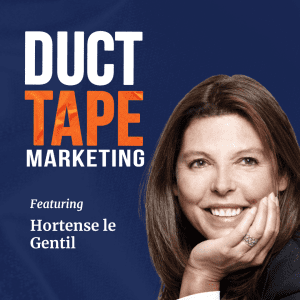 Hortense le Gentil is an executive leadership coach, speaker, and author with over 30 years of experience helping CEOs and senior executives become more authentic and empathetic leaders. In this episode of the Duct Tape Marketing Podcast, we explore what it takes to evolve from being a “hero” leader to a truly “human” one.
Hortense le Gentil is an executive leadership coach, speaker, and author with over 30 years of experience helping CEOs and senior executives become more authentic and empathetic leaders. In this episode of the Duct Tape Marketing Podcast, we explore what it takes to evolve from being a “hero” leader to a truly “human” one.
Biggest takeaway:
Great leadership isn’t about having all the answers—it’s about leading with authenticity, empathy, and vulnerability. Hortense shares practical tips for overcoming mental blocks, connecting with your team on a deeper level, and unlocking your full leadership potential.
If you’re looking to grow as a leader and inspire those around you, this episode is packed with insights to help you thrive in today’s fast-changing world.
Click here to listen to the episode.
5. Russell Henneberry –From Subscribers to Revenue: A Tactical Guide To Mastering Newsletters
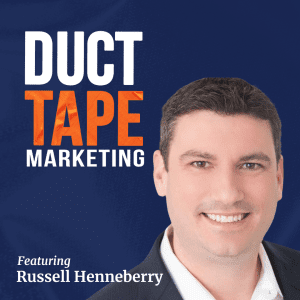
Russell Henneberry is a digital marketing pro, speaker, and founder of The Clikk newsletter. In this episode of the Duct Tape Marketing Podcast, Henneberry and I talk about the power of email newsletters and how they’ve made a big comeback as a must-have tool for marketers.
Biggest takeaway:
Email newsletters are more than just a way to stay in touch—they’re a goldmine for driving revenue. Henneberry shares how to create newsletters that balance valuable content with smart calls to action, keeping your audience engaged while strategically guiding them to take the next step.
We also dive into ways to monetize newsletters, from ads and consulting to info products, and why focusing on metrics like open rates and subscriber quality is key to success.
Click here to listen to the episode.
6. Jay Baer – How to Navigate the New Era of Customer Expectations
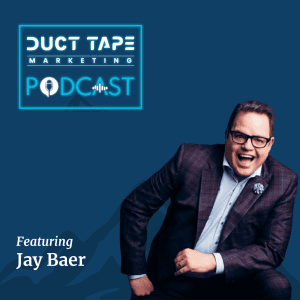 In this episode of the Duct Tape Marketing Podcast, I had a fascinating conversation with Jay Baer, a business growth expert, customer experience researcher, and 7th-generation entrepreneur. Jay, the author of seven bestselling books and founder of six multi-million dollar companies, shares insights from his latest book, The Time to Win: How to Exceed Your Customers’ Need for Speed.
In this episode of the Duct Tape Marketing Podcast, I had a fascinating conversation with Jay Baer, a business growth expert, customer experience researcher, and 7th-generation entrepreneur. Jay, the author of seven bestselling books and founder of six multi-million dollar companies, shares insights from his latest book, The Time to Win: How to Exceed Your Customers’ Need for Speed.
Biggest takeaway:
Jay’s research reveals that two-thirds of customers now value speed as much as price. Saving your customers time is a surefire way to earn their loyalty, while wasting their time can cost you financially. In today’s fast-paced world, speed and responsiveness are essential for delivering exceptional customer experiences and driving revenue growth.
Jay breaks down the six-part “Time to Win” framework, offering actionable strategies for prioritizing speed within your organization and securing a competitive edge.
Click here to listen to the episode.
7. Ryan Deiss – Crushing the Founder’s Curse: Unlocking Business Value Beyond Yourself
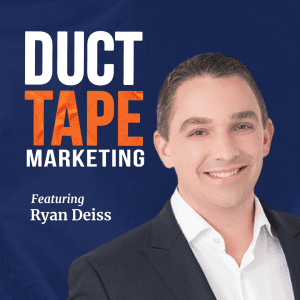 Ryan Deiss, founder of DigitalMarketer.com and a serial entrepreneur, joins me on the Duct Tape Marketing Podcast to share insights from his latest book, Get Scalable: The Operating System Your Business Needs to Run and Scale Without You. In this episode, we dive into strategies for overcoming the Founder’s Curse and creating a business that thrives beyond the founder’s involvement.
Ryan Deiss, founder of DigitalMarketer.com and a serial entrepreneur, joins me on the Duct Tape Marketing Podcast to share insights from his latest book, Get Scalable: The Operating System Your Business Needs to Run and Scale Without You. In this episode, we dive into strategies for overcoming the Founder’s Curse and creating a business that thrives beyond the founder’s involvement.
Biggest takeaway:
To truly scale your business, you need to break free from being indispensable. Ryan shares practical strategies for building value engines, establishing strategic rhythms, and creating high-output teams that can drive growth without constant founder oversight. He also discusses how to map value creation flows and implement effective meeting rhythms to keep your business running smoothly and sustainably.
Click here to listen to the episode.
8. Kate Bradley Chernis – How To Produce Better Content With Collaborative AI
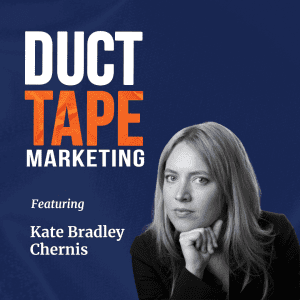
In this episode of the Duct Tape Marketing Podcast, I had the pleasure of chatting with Kate Bradley Chernis, former rock and roll DJ turned founder and CEO of Lately AI. With over 20 years of experience in media and marketing, Kate shares her unique perspective on the evolution of content marketing and how AI is reshaping the industry.
Biggest takeaway:
Content marketing is evolving, and the key to success lies in blending human creativity with the power of AI. Kate shares actionable strategies for cutting through content clutter, crafting personalized social media messaging, and leveraging AI to boost engagement while navigating challenges like data privacy.
Click here to listen to the episode.
9. Amanda Holmes – Walking Billboards and QR Codes
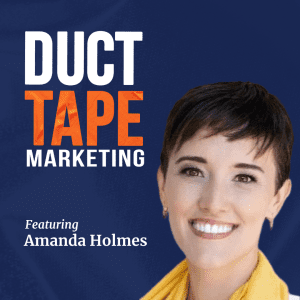 In this episode of the Duct Tape Marketing Podcast, I had the pleasure of speaking with Amanda Holmes, CEO of Chet Holmes International. A true innovator in sales strategy, Amanda shares how she doubled her company’s sales by 1176% in her first year and dives deep into the transformative power of the Dream 100 strategy and other unconventional marketing tactics.
In this episode of the Duct Tape Marketing Podcast, I had the pleasure of speaking with Amanda Holmes, CEO of Chet Holmes International. A true innovator in sales strategy, Amanda shares how she doubled her company’s sales by 1176% in her first year and dives deep into the transformative power of the Dream 100 strategy and other unconventional marketing tactics.
Biggest takeaway:
Amanda explains how the Dream 100 strategy, a proven method developed by her father while working with Charlie Munger, focuses on targeting a select group of high-value prospects to drive exponential growth. She also shares creative marketing approaches, like walking around trade shows with a four-foot billboard and strategically placed QR codes, to seamlessly blend offline and online efforts for maximum impact.
Click here to listen to the episode.
10. Andrew Guttormsen – How to Build Game-Changing Strategy by Choosing Your Customers and Competition

In this episode of the Duct Tape Marketing Podcast, I sat down with Andrew Guttormsen, co-founder of Circle, the all-in-one platform for professional creator communities and world-class brands. With experience as the former VP of Growth at Teachable, Andrew has a wealth of knowledge in courses, memberships, and building growth marketing teams. Together, we explored what makes platinum communities thrive, from onboarding excellence to long-term member retention.
Biggest takeaway:
A thriving online community goes beyond the platform—it’s about fostering engagement, delivering value, and retaining members for the long haul. Andrew shares how platinum communities, like Oprah’s on Circle, use signature gatherings, seamless onboarding, and consistent value delivery to build lasting connections and keep members invested.
Click here to listen to the episode.
We love reviews!
Is your favorite episode on the list? If not, we’d love to hear which one you enjoyed listening to the most!
For our podcast audience, we can’t thank you enough for your support over the years! If you like the show, click on over and subscribe and if you love the show give us a review on iTunes, please!
from Duct Tape Marketing https://ift.tt/82P1Z0r
via
IFTTT




 Hortense le Gentil is an executive leadership coach, speaker, and author with over 30 years of experience helping CEOs and senior executives become more authentic and empathetic leaders. In this episode of the Duct Tape Marketing Podcast, we explore what it takes to evolve from being a “hero” leader to a truly “human” one.
Hortense le Gentil is an executive leadership coach, speaker, and author with over 30 years of experience helping CEOs and senior executives become more authentic and empathetic leaders. In this episode of the Duct Tape Marketing Podcast, we explore what it takes to evolve from being a “hero” leader to a truly “human” one.
 In this episode of the Duct Tape Marketing Podcast, I had a fascinating conversation with Jay Baer, a business growth expert, customer experience researcher, and 7th-generation entrepreneur. Jay, the author of seven bestselling books and founder of six multi-million dollar companies, shares insights from his latest book,
In this episode of the Duct Tape Marketing Podcast, I had a fascinating conversation with Jay Baer, a business growth expert, customer experience researcher, and 7th-generation entrepreneur. Jay, the author of seven bestselling books and founder of six multi-million dollar companies, shares insights from his latest book,  Ryan Deiss, founder of DigitalMarketer.com and a serial entrepreneur, joins me on the Duct Tape Marketing Podcast to share insights from his latest book,
Ryan Deiss, founder of DigitalMarketer.com and a serial entrepreneur, joins me on the Duct Tape Marketing Podcast to share insights from his latest book, 
 In this episode of the Duct Tape Marketing Podcast, I had the pleasure of speaking with Amanda Holmes, CEO of Chet Holmes International. A true innovator in sales strategy, Amanda shares how she doubled her company’s sales by 1176% in her first year and dives deep into the transformative power of the Dream 100 strategy and other unconventional marketing tactics.
In this episode of the Duct Tape Marketing Podcast, I had the pleasure of speaking with Amanda Holmes, CEO of Chet Holmes International. A true innovator in sales strategy, Amanda shares how she doubled her company’s sales by 1176% in her first year and dives deep into the transformative power of the Dream 100 strategy and other unconventional marketing tactics.


 In this episode of the
In this episode of the  Want to elevate your marketing game? AdCritter pairs Connected TV ads with precise digital retargeting to drive real results. Discover how their full-funnel strategy can help your business grow smarter. Let them know Duct Tape Marketing sent you, and you’ll get a dollar-for-dollar match on your first campaign! Learn more at
Want to elevate your marketing game? AdCritter pairs Connected TV ads with precise digital retargeting to drive real results. Discover how their full-funnel strategy can help your business grow smarter. Let them know Duct Tape Marketing sent you, and you’ll get a dollar-for-dollar match on your first campaign! Learn more at 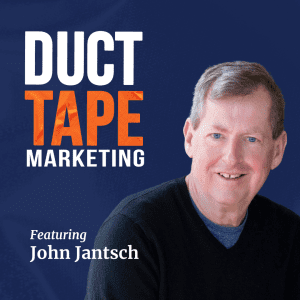 In this episode of the
In this episode of the